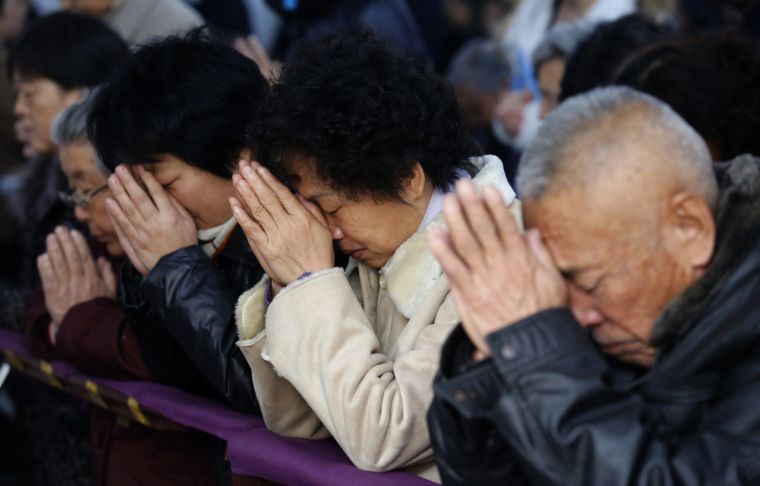As Theresa May visits China, will she call on the regime to protect religious rights and stop persecuting Christians?
Prime Minister Theresa May's first official visit to China, which begins today, is billed as an opportunity to boost trade with an important ally. But it will also take place against the backdrop of the country's violations of fundamental human rights, including freedom of religion or belief.
In the last month, Christians have been detained, and unregistered churches shut down or destroyed ahead of the implementation of revised Regulations on Religious Affairs, which strengthen state control over religious activities in China.

Unregistered churches, sometimes called house churches, are independent churches which have not registered with the state-sanctioned Three Self Patriotic Movement. The new regulations are due to come into force tomorrow, giving Mrs May a rare opportunity to speak directly to the Chinese government and publicly to reiterate the UK's commitment to defending human rights.
A few weeks ago, authorities in Shanxi Province used dynamite to demolish the 50,000-member Golden Lampstand Church. Meanwhile, two pastors of Living Stone Church, an unregistered Protestant church which at one time had over 700 members, have been fined over US$1 million for collecting 'illegal' donations from members of the congregation.
Pastor Su Tianfu and Pastor Yang Hua have filed several appeals on the basis that the money was voluntarily donated by church members and was only used to fund church activities. The appeals were rejected.
In Yunnan province, meanwhile, hundreds of Christians have been arrested and accused of being members of an 'evil cult'. In one such case, six members of an unregistered church group were sentenced on January 18 to up to 13 years in prison for 'using an evil cult to undermine law enforcement'. They were accused of belonging to a group called the Three Grades of Servants, which the government has labelled an 'evil cult' – charges which they deny.
Although the situation for unregistered churches varies considerably from place to place, these are not isolated incidents. China is a large country, and while different approaches are being taken by various provincial authorities, when taken together, these cases may suggest a long-term plan to target independent religious communities.
Being in China as the new laws take effect gives Theresa May an excellent opportunity to draw attention to an under-reported issue, and to bring concerns for unregistered churches, and about the new regulations, into the spotlight. Closed-door diplomacy is not enough. The Chinese government cares about its image, and addressing human rights concerns publicly makes them harder to ignore or downplay.
The treatment of churches like Living Stone Church reveals that the government's focus is on the control of religious life, rather than the protection of the right to freedom of religion or belief.
Churches which are especially large or influential are more likely to draw the attention of the authorities. For years, Living Stone Church, which had a congregation of over 700 people at its peak, was targeted by the government, which attempted to convince the church to join the state-sanctioned patriotic association for Protestant churches. When they refused to do so, they were put under increasing pressure to close.
On November 18, 2015, the church received a 'Rectification Order' which stated that the church's use of a commercial building was illegal. Several church members were detained or fined in connection with the case. On January 6, 2017, Pastor Yang Hua was sentenced to two and a half years in prison, while Pastor Su Tianfu was put under house arrest, where he remains to this day. Deacon Zhang Xiuhong spent more than two years in detention before being released in August 2017.
There are fears that the new regulations will mean even less space for unregistered groups, and that even churches which have had no problems with the authorities until now could see this change in the future. While unregistered churches like Living Stone Church are coming under pressure, the authorities have increased their surveillance of registered churches.
Other religious groups are also being targeted by the government. In Sichuan Province, Chinese authorities have taken over administrative control at Larung Gar Buddhist Institute, one of the largest Buddhist teaching centres in the world. In July 2016, a 'renovation' campaign at the institute resulted in mass evictions and the demolition of hundreds of homes. In the Xinjiang region in China's northwest, authorities continue to arrest and detain Uyghur Muslims and limit religious practice as part of a 'strike hard' campaign they claim is aimed at combating religious extremism and other security threats.
We hope and pray that in the coming days, Theresa May will use her high-profile visit to call on the Chinese government to protect human rights, and particularly the right to freedom of religion or belief, both in law and in practice.
Kiri Kankhwende is Public Affairs Team Leader at Christian Solidarity Worldwide.











